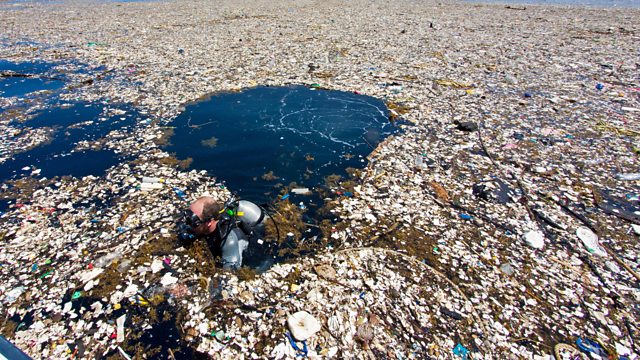
Ocean Plastic Waste
Ocean plastic waste; Nuclear fallout in the Pacific; Trophy hunting; 50 years since first heart transplant; FGM; Narwhal escape; Indian crop yields; Exercise
Nations have agreed that the world needs to completely stop plastic waste from entering the oceans. The UN resolution has no timetable and is not legally binding. But ministers at an environment summit in Kenya believe it will set the course for much tougher policies and send a clear signal to business. ����ý Science Correspondent Victoria Gill brings us the latest on the story.
Nuclear Fallout in the Pacific
In the 1940s and 1950s, the US conducted 66 nuclear weapons tests at the Bikini and Enewetak Atolls in the Pacific. Now a lingering remnant of this history is the Runit Dome that houses radioactive debris left over from the weapons tests. Activists are adamant that it is the source of radiation that is polluting the ocean that surrounds them. So far it is set up as a political and social issue, but what does the science tell us about what is happening in this area? Roland Pease spoke to radiochemist Ken Buesseler from the Woods Hole Oceanographic Institution.
Trophy Hunting
Trophy hunters are always after the lion with the largest darkest name and the stag with the most impressive antlers. Gareth Mitchell spoke with Rob Knell at Queen Mary University of London who has found that removing a small proportion of these top males can drive whole populations to extinction, if their environment is changing.
50 Years Since the First Heart Transplant
The first ever heart transplant took place in Cape Town in South Africa fifty years ago this week. That patient died after just 18 days – but today around 5,000 people have heart transplants every year. A shortage of donor hearts means there is often a wait – and an artificial pump called an L-VAD can buy time. We hear from doctors and a patient about the advances in technology which have made the pumps easier to live with.
FGM
The World Health Organization says that more than 200 million women – most in sub-Saharan Africa - are subjected to female genital mutilation (FGM). The girls who have their labia and clitoris cut away often have lifelong health problems as a result. FGM was banned in The Gambia two years ago – where 3 out of 4 girls have been cut. Irene Caselli travelled to West Africa and heard how attitudes are slowly changing.
Narwhal Escape
Scientists who fitted heart rate-monitoring tags to Arctic narwhals have discovered a strange paradox in how the animals respond to threats. When these tusked whales are frightened, their hearts slow, but at the same time they swim quickly to escape. Scientists say the response could be "highly costly" - because they exert themselves with a limited blood supply. Victoria Gill reports.
Indian Crop Yields
For farmers the date for sowing seeds is critical to ensure they harvest a good crop. Gareth Mitchell talks to Dr Suhas Wani, from the International Crop Research Institute for the Semi-Arid Tropics about an AI Sowing App powered by machine learning that alerts farmers about the best time to sow seeds.
Exercise
Exercise helps to keep us healthy, but thinking that we do less than our friends can have a negative impact and even shorten our lives. The American study analysed 21 years’ worth of data and could influence public health campaigns aimed at making us more active. Claudia Hammond spoke to Octavia Zahrt from Stanford University about this research.
(Photo caption: Underwater photographer Caroline Power found the plastic blanket of forks, bottles and rubbish 15 miles off the coast of Roatan heading towards the Cayos Cochinos Marine Reserve – credit: AFP / Caroline Power)
The Science Hour was presented by Claudia Hammond with comments from Victoria Gill, ����ý Science Correspondent
Producer: Katy Takatsuki
Last on
More episodes
Previous
Next
Broadcast
- Sat 9 Dec 2017 12:06GMT����ý World Service Americas and the Caribbean
Podcast
-
![]()
Unexpected Elements
The news you know, the science you don't

